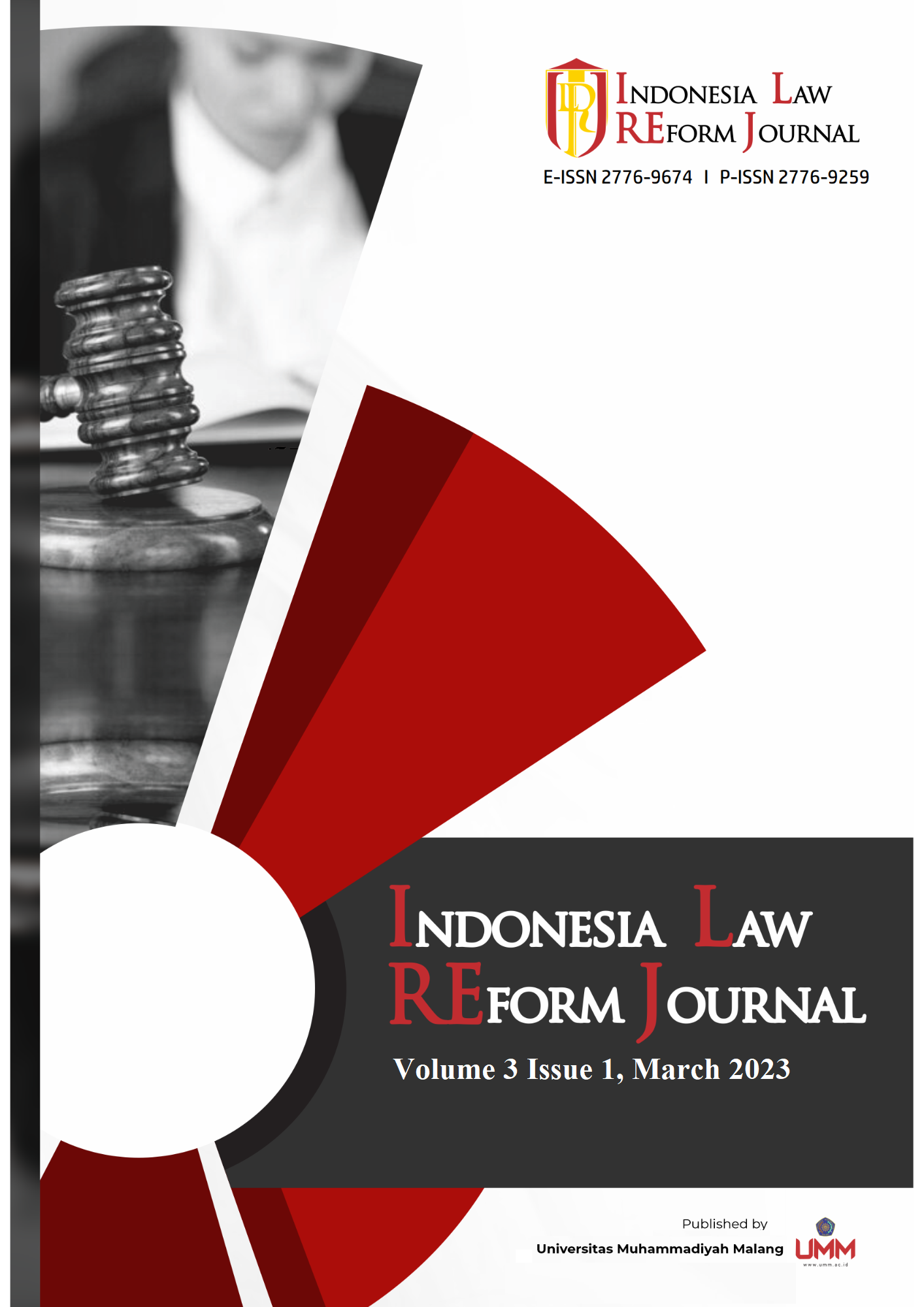Rethinking the Sovereignty Principle: Is it a Legal Provision or a Political Domain Nowadays?
DOI:
https://doi.org/10.22219/ilrej.v3i1.25686Keywords:
sovereignty principle, legal provision, territory, international lawAbstract
The relation of international community currently emphasize that soveregnty princple could not more decide as the main principle in managing a territory of state, even though sovereignty is the main requirement for a state to enforce its law and to do cooperation among entities in international relations. In order to find out the exact interpretation of sovereginty principle, this article used qualitative method. This study find out that sovereignty is recognized as one of the principles in recognizing a state. This term has a political nuance, because the aspect of recognition itself is not a legal aspect but a political one. Moreover, in several cases, even though a country had proclaimed its sovereignty, there are still opportunities for a part of the territory to become independent or even to be acquired by other countries. Thus, it seems that the principle of sovereignty has a tendency as part of politics. However, the principle of sovereignty remains a legal principle based on the provisions of international law, where each country has exclusive rights in every part of its territory, namely in land, air and sea. Currently, the concept of international law has expanded to the politic of international law study, which numerous aspects of law enforcement mingle with a country's policies that are synonymous with political aspects. Additionally, that the current principle of sovereignty should be completed with another legal principle in international law.
Abstrak
Hubungan masyarakat internasional saat ini menekankan bahwa prinsip kedaulatan tidak dapat lagi diputuskan sebagai prinsip utama dalam pengelolaan suatu wilayah negara, padahal kedaulatan merupakan syarat utama bagi suatu negara untuk menegakkan hukumnya dan untuk melakukan kerjasama antar entitas dalam hubungan internasional. Untuk mengetahui interpretasi yang tepat dari prinsip kedaulatan, artikel ini menggunakan metode kualitatif. Studi ini menemukan bahwa kedaulatan diakui sebagai salah satu prinsip dalam pengakuan suatu negara. Istilah ini bernuansa politis, karena aspek pengakuan itu sendiri bukanlah aspek hukum melainkan aspek politik. Apalagi, dalam beberapa kasus, meski suatu negara telah memproklamasikan kedaulatannya, masih ada peluang bagi sebagian wilayahnya untuk merdeka atau bahkan diakuisisi oleh negara lain. Dengan demikian, nampaknya prinsip kedaulatan memiliki kecenderungan sebagai bagian dari politik. Namun asas kedaulatan tetap merupakan asas hukum berdasarkan ketentuan hukum internasional, dimana setiap negara memiliki hak eksklusif di setiap bagian wilayahnya, yaitu di darat, udara dan laut. Saat ini, konsep hukum internasional telah merambah ke politik kajian hukum internasional, dimana berbagai aspek penegakan hukum berbaur dengan kebijakan suatu negara yang identik dengan aspek politik. Oleh karena itu, disimpulkan bahwa asas kedaulatan yang berlaku saat ini harus dilengkapi dengan asas hukum lain dalam hukum internasional.
Downloads
References
Acosta García, Nicolás, and Niels Fold. “The Coloniality of Power on the Green Frontier: Commodities and Violent Territorialisation in Colombia’s Amazon.” Geoforum 128 (2022): 192–201. https://doi.org/10.1016/j.geoforum.2021.11.025.
Alkhalili, Noura, Muna Dajani, and Yahia Mahmoud. “The Enduring Coloniality of Ecological Modernization: Wind Energy Development in Occupied Western Sahara and the Occupied Syrian Golan Heights.” Political Geography 103, no. September 2022 (2023): 102871. https://doi.org/10.1016/j.polgeo.2023.102871.
Article, Full Length. “Can Direct Democracy Deliver an Alternative to Extractivism ? An Essay on Popular Consultations” 98, no. July (2022). https://doi.org/10.1016/j.polgeo.2022.102715.
Beggs, Lachlan, and Cameo Dalley. “Wildfire Bureaucracy: The Affective Dimensions of State Engagement with Indigenous Peoples in Southeast Australia.” Geoforum 138, no. January (2023): 103675. https://doi.org/10.1016/j.geoforum.2023.103675.
Benson, Eleanor, Morgan Brigg, Ke Hu, Sarah Maddison, Alexia Makras, Nikki Moodie, and Elizabeth Strakosch. “Mapping the Spatial Politics of Australian Settler Colonialism.” Political Geography 102, no. March 2022 (2023). https://doi.org/10.1016/j.polgeo.2023.102855.
Bleshchik, A. V., E. G. Kalinina, and S. E. Nesmeyanova. “Transformation of Constitutional Identity Due to Contemporary Challenges.” Law Enforcement Review 5, no. 3 (2021): 87–100. https://doi.org/10.52468/2542-1514.2021.5(3).87-100.
Boermauna. Hukum Internasional (Pengertian Peranan Dan Fungsi Dalam Era Dinamika Global). Bandung: PT Alumni, 2001.
Christian Reus-Smit. Politik Hukum Internasional. Edited by Derta Sri Widowatie; Irfan M Zaki. Terjemahan. Bandung: Nusamedia, 2015.
Christiani, Theresia Anita. “Normative and Empirical Research Methods: Their Usefulness and Relevance in the Study of Law as an Object.” Procedia - Social and Behavioral Sciences 219 (May 31, 2016): 201–7. https://doi.org/10.1016/J.SBSPRO.2016.05.006.
Cummings, J Joseph. “Ownership and Control of Airspace” 37, no. 2 (1953).
Dame, Notre, Law Review, and Adolph C Hugin. “Airspace Rights and Liabilities As Affected by Aircraft Operation” 26, no. 4 (1951).
Dr. Vladimir, Vega Falcon. “Wilayah Perbatasan Negara Dalam Perspektif Hukum Internasional.” Jurnal Proyuris 2, no. 1 (2020): 169–84.
Eckes, Christina. “EU Autonomy: Jurisdictional Sovereignty by a Different Name?” European Papers - A Journal on Law and Integration 5, no. 1 (2020): 319–29. https://doi.org/10.15166/2499-8249/381.
Emmenegger, Rony. “Unsettling Sovereignty : Violence , Myths and the Politics of History in the Ethiopian Somali Metropolis.” Political Geography 90 (2021): 102476. https://doi.org/10.1016/j.polgeo.2021.102476.
Enyew, Endalew Lijalem. “Application of the Right to Permanent Sovereignty over Natural Resources for Indigenous Peoples: Assessment of Current Legal Developments.” Arctic Review on Law and Politics 8, no. 0 (2017): 222–45. https://doi.org/10.23865/arctic.v8.947.
Erni Eriza Siburian, Arie Afriansyah. “Sport Diplomacy and State Sovereignty : Case Study On Indonesia’ S Effort To Guard The Sovereignty Of Papua Erni Eriza Siburian , Arie Afriansyah Faculty of Law , Universitas Indonesia” 7, no. 1 (2018). https://doi.org/10.20961/yustisia.v7i1.19696.
Galeş, Narcisa, and Dumitriţa Florea. “The Creation of International Law during the Feudalism.” Procedia - Social and Behavioral Sciences 149 (2014): 365–70. https://doi.org/10.1016/j.sbspro.2014.08.274.
Hidayah, Nur Putri, Quincy R Cloet, and David Pradhan. “The Implementation of Labor Development Principles According to Job Creation Law as a Reason to Protect Wages Rights.” Bestuur 9, no. 1 (2021): 68–76. https://doi.org/https://dx.doi.org/10.20961/bestuur.v9i1.49252.
Houde, Magali, Eva M. Krümmel, Tero Mustonen, Jeremy Brammer, Tanya M. Brown, John Chételat, Parnuna Egede Dahl, et al. “Contributions and Perspectives of Indigenous Peoples to the Study of Mercury in the Arctic.” Science of the Total Environment 841, no. December 2021 (2022). https://doi.org/10.1016/j.scitotenv.2022.156566.
In, Territory, and International Law. “General Principles of International Law : Principle of Uti Possidetis Juris Общие Принципы Международного Права :,” no. 3 (2017): 31–39. https://doi.org/10.24833/0869-0049-2017-3-31-39.
Jiménez, Ramir Rabaza. “The Unilateral Declaration of Independence in Catalonia , 2017 : Strategies of Legitimation in Political Discourses .,” 2020, 1–40.
Kareng, Yaya. “International Aviation/Airspace Law an Overview.” International Journal of Law Reconstruction 4, no. 1 (2020): 56. https://doi.org/10.26532/ijlr.v4i1.10941.
Kearns, Suzanne K. “International Air Law.” Fundamentals of International Aviation, no. c (2018): 1–30. https://doi.org/10.4324/9781315200996-1.
Manggali, Arsyi, Arya Putra, Mohammad Isrok, and Nur Putri Hidayah. “Legal Protection of Remote Working Workers in Particular Time Employment Agreements.” Audito Comparative Law Journal (ACLJ) 4, no. 1 (January 31, 2023): 22–30. https://doi.org/10.22219/ACLJ.V4I1.24033.
Marwasta, Djaka. “Pendampingan Pengelolaan Wilayah Perbatasan Di Indonesia: Lesson Learned Dari KKN-PPM UGM Di Kawasan Perbatasan.” Jurnal Pengabdian Kepada Masyarakat (Indonesian Journal of Community Engagement) 1, no. 2 (2016): 204. https://doi.org/10.22146/jpkm.10607.
Mita Noveria, Ganewati Wuryandari, John Haba, Firman Noor, Chitra Indah Yuliana, Rucianawati. Kedaulatan Indonesia Di Wilayah Perbatasan (Perspektif Multidimensi). Edited by Mita Noveria. Jakarta: Yayasan Obor Indonesia, 2017.
Paasi, Anssi, Azmeary Ferdoush, Reece Jones, Alexander B Murphy, John Agnew, Paulina Ochoa, Juliet J Fall, and Giada Peterle. “Locating the Territoriality of Territory in Border Studies.” Political Geography 95, no. January (2022): 102584. https://doi.org/10.1016/j.polgeo.2021.102584.
Paulus, Andrea. Routledge Handbook of International Law. Edited by David Armstrong. USA and Canada: Routledge, 2009.
Polkowska, Małgorzata. “Limitations in the Airspace Sovereignty of States in Connection with Space Activity.” Security and Defence Quarterly 20, no. 3 (2018): 42–56. https://doi.org/10.5604/01.3001.0012.5151.
Razin, Assaf. “Understanding National-Government Policies Regarding Globalization : A Trade-Finance Analysis.” Journal of Government and Economics 8, no. December 2022 (2023): 100060. https://doi.org/10.1016/j.jge.2023.100060.
Riyanto, Sigit. “Kedaulatan Negara Dalam Kerangka Hukum Internasional Kontemporer.” Yustisia Jurnal Hukum 1, no. 3 (2012): 5–14. https://doi.org/10.20961/yustisia.v1i3.10074.
Rotberg, Robert I. “Failed States, Collapsed States, Weak States: Causes and Indicators.” State Failure and State Weakness In a Time of Terror, 2003, 1–26.
Tymchenko, Leonid. “The Legitimacy of Acquisition of State Territory,” n.d.
Verellen, Thomas. “European Sovereignty Now? A Reflection on What It Means to Speak of ‘European Sovereignty.’” European Papers - A Journal on Law and Integration 5, no. 1 (2020): 307–18. https://doi.org/10.15166/2499-8249/383.
White, Jonathan Ian. “A Critical Reflection on Sovereignty in International Relations Today.” E-International Relations, 2019, 1–6.
Wimbo, Sofyan, Agung Pradnyawan, Arief Budiono, and Jan Alizea Sybelle. “Aspects of International Law and Human Rights on The Return of The Taliban in Afghanistan.” Audito Comparative Law Journal (ACLJ) 3, no. 3 (November 16, 2022): 132–38. https://doi.org/10.22219/ACLJ.V3I3.23237.
Zeleke, Shumet Amare. “Self-Determination, Secession, and Indigeneity in Ethiopia’s Federation.” Social Sciences & Humanities Open 7, no. 1 (2023): 100415. https://doi.org/10.1016/j.ssaho.2023.100415.
Downloads
Published
How to Cite
Issue
Section
License
Copyright (c) 2023 Dewi Nurvianti -, Aris Irawan, Fathurrahman, Sri Fridayanti

This work is licensed under a Creative Commons Attribution-ShareAlike 4.0 International License.











